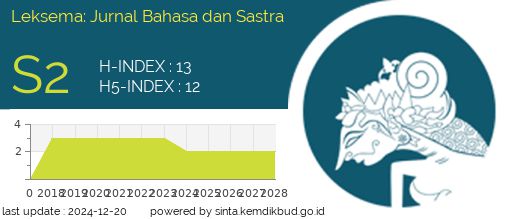A LEARNING MODEL DEVELOPMENT OF CRITICAL READING COMPREHENSION THROUGH RECIPROCAL TEACHING
DOI:
https://doi.org/10.22515/ljbs.v4i1.1516Keywords:
reciprocal teaching, learning model, critical readingAbstract
This research aims at designing a learning model of critical reading based on Reciprocal Teaching. This research is a Research and Development (R&D) which applies the theory of Borg & Gall (2007). The subject is the second semester students that consist of 60 students in the academic year of 2017-2018. Data are obtained form interviews of lecturers and students, observation during implementation, and validation notes. The expert judgment was applied to validate the design of the learning model. The final product of the research is a learning model of critical reading by applying the strategy of Reciprocal Teaching consisted of four activities namely summarizing, questioning, clarifying, and predicting which is extended into six activities namely, predicting, questioning, clarifying, self-monitoring, summarizing, and evaluating. The model is considered to be supportive to the critical reading instructional since the students can complete the written tasks successfully.
Downloads
References
Browne, MN & Keeley, SM. 2007. Asking the Right Questions. A Guide to Critical Thinking. New Jersey: Pearson Prentice-Hall
Celce-Murcia, M, Z. Dornyei&S. Thurrel. 1995. “Communicative Competence: A Pedagogically Motivated Model with Content Specificationsâ€. In Issues in Applied Linguistics, 6 (2): 5-35
Flemming, Laraine E. 1987. Reading for Result. Boston: Houghton Mifflin Co.
Gall, Meredith P, Joyce P Gall&Walter R. Borg, 2007. Educational Research (8th edition). Boston: Pearson Education.
Ismail, Nizam Hairul et al. 2012. “The Role of Reciprocal Teaching Strategy as an Important Factor of Improving Reading Motivationâ€. Elixir International Journal: 11836-11841
Kennedy, Eddie C. 1981. Methods in Teaching Developmental Reading (2nd edition). Illinois: Peacock Publishers.
Lysynchuk, LM et al. 1990. Reciprocal Teaching Improves Standardized Reading-Comprehension Performance in Poor Comprehenders. The Elementary School Journal, 90 (5): 469-484
Joyce, Bruce, Marsha Weil &Emily Calhoun. 2004. Models of Teaching. (7th edition). Boston:Pearson
Meyer, Kylie. 2010. “Diving into Reading: Revisiting Reciprocal Teaching in the Middle Yearsâ€. Literacy Learning:The Middle Years. 8 (1): 41-52
Moon, Jennifer. 2008. Critical Thinking: An Exploration of Theory and Practice. New York: Routledge
Nuttall, C. 2000. Teaching Reading Skills in a Foreign Language. Oxford: Macmillan Publishers Limited
Oczkus, Lori. 2013. “Reciprocal Teaching: Powerful Hands-on Comprehension Strategyâ€. The Utah Journal of Literacy, 16 (1): 34-38
Palincsar, Annemarie Sullivan & Ann L.
Brown.1984. Reciprocal Teaching of Comprehension-fostering and Comprehension-monitoring Activities. Cognition and Instruction. 1 (2): 117-175
Richards, JC & R. Schmidt, 2002. Longman Dictionary of Language Teaching and Applied Linguistics. Harlow: Pearson Education Limited
Scanlon, DM. et al. 2010. Early Intervention for Reading Difficulties: The Interactive Strategies Approach. New York: The Guilford Press
Stern, HH. 1983. Fundamental Concepts of Language Teaching. Oxford: Oxford University Press
Sugirin. 2002. The Comprehension Strategies of Above Average English as a Foreign Language (EFL) Readers. Dissertation. Victoria: Deakin University
Sutopo, HB. 2002. Metodologi Penelitian Kualitatif. Surakarta: Sebelas Maret University Press.
Tarchi, Christian & Giuliana Pinto. 2016. “Reciprocal teaching: Analyzing Interactive Dynamics in the Co-Construction of a Text’s Meaningâ€. Journal of English Teaching for a Purpose. 1 (1)
Wallace, Catherine. 2003. Critical Reading in Language Education. New York: Palgrave Macmillan
Westwood, Peter. 2001. Reading and Learning Difficulties: Approches to Teaching and Assessment. Victoria: The Australian Council for Educational Research Ltd.
Downloads
Published
Issue
Section
License
The copyright of the received article shall be assigned to the publisher of the journal. The intended copyright includes the right to publish the article in various forms (including reprints). The journal maintains the publishing rights to published articles.
In line with the license, the authors and users (readers or other researchers) are allowed to share and adapt the material only for non-commercial purposes. In addition, the material must be given appropriate credit, provided with a link to the license, and indicated if changes were made. If authors remix, transform or build upon the material, authors must distribute their contributions under the same license as the original.






